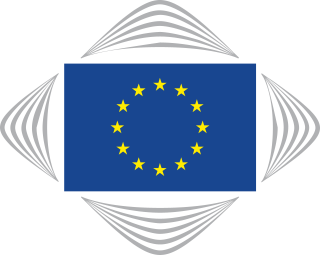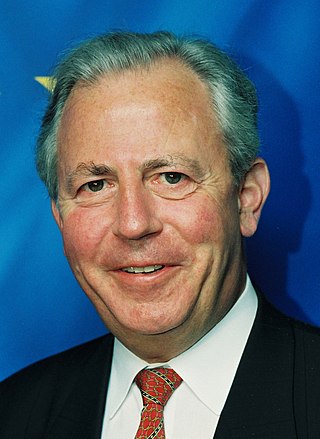Related Research Articles

The European Parliament (EP) is one of the legislative bodies of the European Union and one of its seven institutions. Together with the Council of the European Union, it adopts European legislation, following a proposal by the European Commission. The Parliament is composed of 705 members (MEPs). It represents the second-largest democratic electorate in the world, with an electorate of 375 million eligible voters in 2009.

The European Committee of the Regions (CoR) is the European Union's (EU) assembly of local and regional representatives that provides sub-national authorities with a direct voice within the EU's institutional framework.

The European Court of Auditors is the supreme audit institution of the European Union (EU). It was established in 1975 in Luxembourg and is one of the seven EU institutions. The Court comprises one member from each EU member state supported by approximately 800 civil servants.

The president of the European Parliament presides over the debates and activities of the European Parliament. They also represent the Parliament within the European Union (EU) and internationally. The president's signature is required for laws initiated under co-decision and the EU budget.

The Santer Commission (sahn-TEHR) was the European Commission in office between 23 January 1995 and 15 March 1999. The administration was led by Jacques Santer.

The institutions of the European Union are the seven principal decision-making bodies of the European Union and the Euratom. They are, as listed in Article 13 of the Treaty on European Union:
Margarita Starkevičiūtė is a member of EU institutions' advisory boards on financial markets and the digital economy, external academic expert for European Parliamentary Research Services. In 2004-2009 she was a Member of the European Parliament (MEP) elected in Lithuania, ALDE political group, Economic and Monetary Affairs Committee, Budget Committee, Budgetary Control Committee, Temporary committee on policy challenges and budgetary means of the enlarged Union 2007-2013, Delegation for relations with Japan, Delegation for relations with Australia and New Zealand, Delegation for relations with Iran. PhD in socials science (economics) from Vilnius University (Lithuania),“Strategy of Long-Term Economic Growth in Transition and its Implementation in Lithuania”. The subject of research is the growth and strategy of economic policy. The aim is to evaluate the development of the economy in transition and applying modern growth model, to define the determinants and sources of long-term economic growth and to outline government economic policy strategy facilitating the growth of an economy. 1996-2004 and 2009-2014 was a lecturer, Associate Professor and researcher at Vilnius University. 1994–2001, a Head of Market Analysis Group, financial markets in Lithuania. 1978–1994, an economist and advisor for foreign relations, different Lithuania's public institutions and Ministries. Graduated in 1978 from Vilnius University with the degree in economics.

Janusz Czesław Wojciechowski is a Polish politician and was a long-standing Member of the European Parliament, elected from the Lodz Voivodship representing the Polish People's Party (PSL) (2004–2006), the Polish People's Party "Piast" (2006–2010) and, lately, Law and Justice. In 2016, he left the parliament to become a member of the Court of Auditors. Since 2019 he has been the European Commissioner for Agriculture.
The Committee on the Environment, Public Health and Food Safety (ENVI) is a committee of the European Parliament. It has 81 full members and is currently chaired by Pascal Canfin.

The budget of the European Union is used to finance EU funding programmes and other expenditure at the European level.

The 2009 European Parliament election was held in the 27 member states of the European Union (EU) between 4 and 7 June 2009. A total of 736 Members of the European Parliament (MEPs) were elected to represent some 500 million Europeans, making these the biggest trans-national elections in history. An additional 18 observers were pre-elected.

Marta Andreasen is an Argentine-born Spanish accountant. She was employed in January 2002 by the European Commission as Chief Accountant, and raised concerns about flaws in the commission's accounting system which she felt left it vulnerable to potential fraud. Elected as a Member of the European Parliament for the UK Independence Party (UKIP) in the 2009 election, she defected to the Conservative Party in February 2013. She lost her seat in the 2014 European Parliamentary election.
The Budgetary treaties of the European Communities were two treaties in the 1970s amending the Treaty of Rome in respects to powers over the Community budget.

Sidonia Elżbieta Jędrzejewska is a Polish politician and MEP. She was the Undersecretary of State in the Office of the Committee for European Integration in Poland (2008–2009).
Ingeborg Helen Gräßle is a German politician of the Christian Democratic Union (CDU) who has been serving as a member of the German Bundestag since the 2021 elections, representing the Backnang – Schwäbisch Gmünd district. She previously served as a Member of the European Parliament (MEP) from 2004 until 2019, where chaired of the Budgetary Control Committee.

Reimer Böge is a German politician who served as Member of the European Parliament (MEP) from 1989 until 2019. He is a member of the Christian Democratic Union of Germany, part of the European People's Party.

Monika Hohlmeier is a German politician who has been serving as a Member of the European Parliament (MEP) since 2009. She is a member of the Christian Social Union, part of the European People's Party. Between 1998 and 2005 she served as Bavarian State Minister for Education and Cultural Affairs.

The Progressive Alliance of Socialists and Democrats (S&D) is the political group in the European Parliament of the Party of European Socialists (PES). The Progressive Alliance of Socialists and Democrats was officially founded as a Socialist Group on 29 June 1953 which makes it the second oldest political group in the European Parliament after Renew Europe (Renew). It adopted its present-day name on 23 June 2009. Centre-left in orientation, the group mostly comprises social-democratic parties and is affiliated with the Progressive Alliance and Socialist International.

Petri Ilari Sarvamaa is a Finnish politician who has been serving as Member of the European Parliament (MEP) since 2012. He is a member of the National Coalition Party, part of the European People's Party. Before becoming an MEP, he had a long career as a journalist at Finland's national broadcasting company Yle.

Siegfried Mureșan is a Romanian economist and politician, vice-president of the European People's Party (EPP) since November 2019, vice-president of the European People's Party Group in the European Parliament and member of the National Liberal Party (PNL). He was elected as Member of the European Parliament (MEP) from Romania in 2014 and 2019. Previously, he was a member of the People's Movement Party (PMP) between 2014 and 2018 and the Democratic Liberal Party (PDL) before 2014.
References
- ↑ "CONT > Members". European Parliament Committees. Retrieved 2022-09-02.
- ↑ Committee on Budgetary Control Archived 2013-06-02 at the Wayback Machine , EPP Group in the European Parliament, retrieved on 13 April 2013.
- ↑ Overview, Committee on Budgetary Control, retrieved 13 April 2013.
- ↑ , Overview of Discharge Procedure 2011, Budget Control Committee of the European Parliament, retrieved 29 May 2013.
- ↑ chairs chosen European Voice , 21 July 2004.
- ↑ Simon Taylor (31 January 2007), Committee chairs finally saddle up European Voice .
- ↑ Simon Taylor (22 July 2009), New-look Parliament carves up the top jobs European Voice .
- ↑ Simon Taylor (22 July 2009), New-look Parliament carves up the top jobs European Voice .
- ↑ The new committee chairs Politico Europe , 8 July 2014.